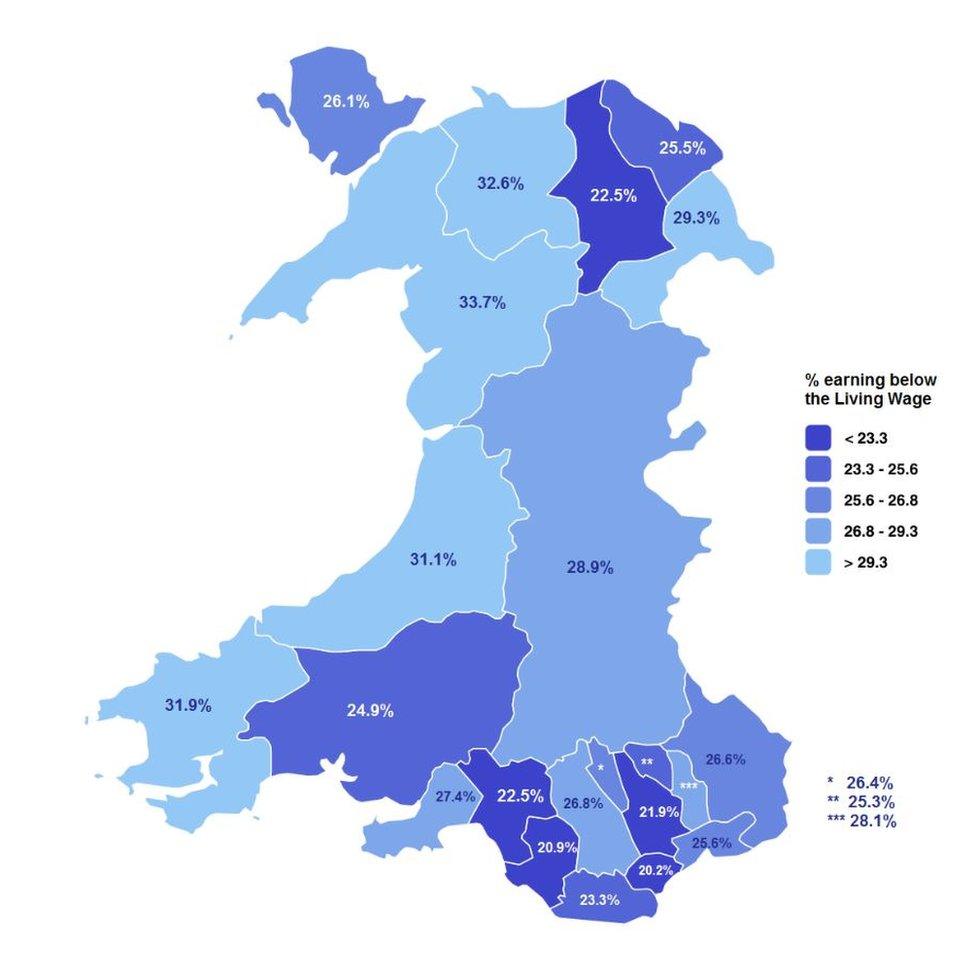Call to pay 300,000 Wales employees voluntary Living Wage
- Published

Nearly 300,000 employees in Wales are not paid the voluntary Living Wage, according to a think-tank.
The Bevan Foundation called for a target to increase the pay of 6,000 workers a year, with an extra 2,000 in the Cardiff Capital Region.
Business group FSB Wales said it should be "an aspirational goal" for firms but there are issues for some industries.
The Welsh Government said it was committed to taking "further action on the Living Wage."
The voluntary Living Wage is an hourly rate based on the amount needed to cover the basic costs of living - currently £8.25 an hour.
It is different to the mandatory National Living Wage, which came into force on 1 April, requiring employers to pay workers aged 25 and over at least £7.20 an hour.
The Bevan Foundation said women, those in part-time employment and workers in industries such as retail and social care were most at risk of being paid less than the Living Wage.
Director Dr Victoria Winckler said evidence from elsewhere in the UK showed it increased productivity, improved staff recruitment and retention, gave workers "more cash in their pockets" and benefitted the local economy by saving public money.

The percentage of employee jobs paid below the Living Wage in Wales’ local authority areas in 2015, according to the Bevan Foundation
There are 70 accredited employers based in Wales, as well as UK-wide organisations with outlets there.
But the Bevan Foundation highlighted that Living Wage "not-spots" existed in areas including Blaenau Gwent, Flintshire, Anglesey and Monmouthshire which have no accredited employer headquarters there.
"It's a win-win all round, and should be a key part of the Welsh Government's and local authorities' economic strategies," Dr Winckler added.
FSB Wales head of external affairs, Ben Cottam, said paying all staff the Living Wage could have "beneficial effects in staff motivation and reducing staff turnover".
"We know from our own survey work that around half of FSB member businesses already pay all of their employees the voluntary Living Wage or higher," Mr Cottam said.
However, he said there were particular sectors where "wages tend to be lower", such as the social care sector where low pay is "common as a result of the way that industry is structured".
'Positive achievements'
"In such industries we cannot expect wages to rise significantly without addressing the underlying causes," he said.
"If the use of the Living Wage is to become more widespread in social care we need to ensure that payments from the public purse for social care services are made at a level which meets the aspirations of employers to pay staff the Living Wage."
A Welsh Government spokesman said: "We have a manifesto commitment to take further action on the Living Wage and that includes work with local government to widen the adoption of the Living Wage and limit the use of zero hour contracts.
"This will build on the positive achievements of the last assembly when the NHS implemented the Living Wage, increasing the wages of the lowest paid people in our health service.
"We also provide businesses large and small with a range of advice, support and financial assistance which helps them to compete and grow and leaves them in a stronger position to pay their staff a living wage."
Welsh Conservative communities spokesman Mark Isherwood said the National Living Wage would benefit 150,000 Welsh workers by 2020 and his party had "long supported action" to give public sector workers "further support".
"There are clear benefits in terms of productivity and absenteeism, which the voluntary Living Wage can provide," he said.
- Published20 March 2016

- Published1 April 2016

- Published1 November 2015
